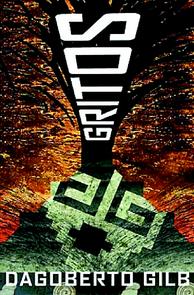Gilb has a right to be angry. He's one of the best working writers in America at the moment, even though he's definitely not a representative of the historically dominant culture. Gilb is a Hispanic man from El Paso who worked as a construction worker for 16 years—not exactly the typical specimen sought out by the holier-than-thou literary elites who rule the publishing world from their palaces in Manhattan.
Most of his stories are set in our area of the country, the west Texas borderlands and New Mexico, a region of the United States that East Coast publishers consider the provinces, when they consider it at all. Yet Gilb's fiction and in particular his short stories are undeniably accomplished. Woodcuts of Women is one of my favorite short story collections of the past five years, and his books The Magic of Blood and The Last Known Residence of Mickey Acuña have been lauded with awards over the last few years.
In Gritos, Gilb tries his hand at essays, many of which explore his feelings of being a literary outsider despite having achieved a large measure of literary success. In a funny way, Gilb covers some ground similar to the ground Franzen covered in that infamous Harper's article. Gilb, too, is concerned with the state of literature in our decaying cyber-cinematic culture. In “Books Suck,” he writes with pain and humor about his 15-year-old son's disdain for all things bookish. In other essays he writes with love about Steinbeck and with bemused enthusiasm for Texas literature.
This book sprawls to subjects as varied as television, cockfighting, Mexican culture, machismo and his mother's past. Some of the essays here have a rambling, unfocussed quality. Just as often, though, Gilb's distinctive voice sears through these pages like a laser beam.
“Gritos” aren't just shouts: They're the cries in Mexican songs. “A grito is most known when mariachis sing,” Gilb writes in his introduction, “that loud extemporaneous howl of triumph, or the sad—and loud, it has to be loud—lament of love lost, the orgasmic agony of love found.” Many of these essays contain that same kind of vitriolic, lyrical passion.
I can't say I enjoyed these essays as much as I enjoyed Gilb's fiction. Gilb's short stories feel more carefully crafted, less flippant, more controlled. Even so, there's plenty in Gritos to hold your attention, and plenty of evidence that Gilb has a long and prolific literary career ahead of him.









